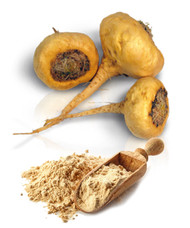Maca: the safer energy drink
Posted by Living Traditionally Inc. on Sep 8th 2018
Anyone looking for a little extra energy now and then (which is everyone), should be aware of the cancer-causing ingredients in most energy drinks. Though they offer a quick energy boost they are also dangerous to your health. Let’s look at the contents of a common energy drink Red Bull:
each 250 ml (8.3 oz) can of Red Bull contains the following: 1000 mg of taurine, 600mg of glucuronolactone, 80 mg of caffeine, 18 mg of niacin (niacinamide), 6 mg of pantothenic acid (calcium d-pantothenate), 2 mg of vitamin B6 (pyridoxide HCI), vitamin B2 (riboflavin), vitamin B12 (cyanocobalamine), inositol, and nonmedicinal ingredients: carbonated water, sucrose, glucose (27 grams of sugar), citric acid, flavors, and caramel.
It so happens that France and Denmark have both prohibited this product as it’s ingredients such as Glucuronolactone is what they describe as a ‘highly dangerous chemical’.
Other ingredients include:
Sucrose and Glucose: A 16-ounce energy drink contains up to 54 grams of sugar (approximately 14 teaspoons). These simple sugars are metabolized rather quickly by the body which leads to a quick energy burst. However, these sugars quickly are fully metabolized, causing a fast energy drop (crash). High concentrations of these simple sugars raise fat levels in the blood and deplete the body of essential minerals such as copper, chronium and zinc. This can cause immunity disorders and of course, insulin resistance.
Vitamin B6: In large quantities (over 1 gram per day), this vitamin can actually be counterproductive by causing nerve damage (peripheral sensory neuropathy). This is due to degeneration of nerves. Daily required amounts for this vitamin are 1.2 to 2.0 mg… Red Bull supplies 220% of that.
Taurine: Some studies have indicated this Amin Acid can cause liver dysfunction when consumed in high quantities. It can also make your body more susceptible to environmental and industrial pollutants.
Synthetic Flavorings: The artificial flavors in Red Bull are similar to those found in perfumes and should be considered carcinogenic.
Caramel: This type of caramel is produced via a process using ammonia… in the end it is pretty much a food coloring. In rats, it causes toxicity.
For Safe and Natural Energy, try Maca not Caffeine
Multiple scientific studies and thousands of years of use have shown Maca to be a great source of energy (compared to caffeine but without the gitters). It provides a much flatter energy curve (avoiding energy crashes) while also providing nutrients and hormonal balancers. It also has been shown it brighten your mood and ease depression
How to use it
Maca doesn’t taste bad, it simply has a nutty flavor.
Try it is smoothies of course, but also in your baked goods and even yogurt and oatmeal. It is best taken shortly before or with meals.

